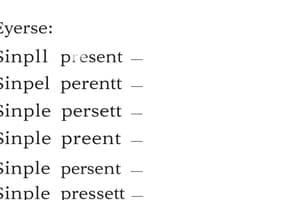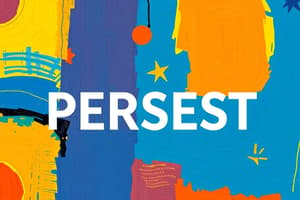Podcast
Questions and Answers
What is the correct form of a yes-no question in the present perfect tense?
What is the correct form of a yes-no question in the present perfect tense?
- Auxiliary verb + subject + past participle (correct)
- Past participle + subject + auxiliary verb
- Subject + past participle + auxiliary verb
- Subject + auxiliary verb + past participle
How is the passive voice formed in the present perfect tense?
How is the passive voice formed in the present perfect tense?
- By adding an adverb to the main verb
- By adding the past participle of the verb 'be' between the auxiliary verb and the main verb (correct)
- By changing the subject to an object
- By adding the past participle of the main verb to the auxiliary verb
What is one of the common uses of the present perfect tense?
What is one of the common uses of the present perfect tense?
- To describe habitual actions
- To describe future plans
- To describe completed actions in the past
- To describe experiences or changes (correct)
What type of words are often used with the present perfect tense?
What type of words are often used with the present perfect tense?
What is the function of the present perfect tense?
What is the function of the present perfect tense?
What type of sentence is 'The project has been developed by the team'?
What type of sentence is 'The project has been developed by the team'?
How is the present perfect simple formed?
How is the present perfect simple formed?
What is the function of the present perfect continuous?
What is the function of the present perfect continuous?
How is the present perfect continuous formed?
How is the present perfect continuous formed?
How are negatives formed in the present perfect tense?
How are negatives formed in the present perfect tense?
When is the present perfect simple tense used?
When is the present perfect simple tense used?
Which of the following sentences uses the present perfect simple correctly?
Which of the following sentences uses the present perfect simple correctly?
What does the present perfect simple tense suggest when used to describe multiple actions at different times?
What does the present perfect simple tense suggest when used to describe multiple actions at different times?
In the sentence 'The army has attacked that city five times,' what does the present perfect simple indicate?
In the sentence 'The army has attacked that city five times,' what does the present perfect simple indicate?
Which of the following is NOT an unspecific expression used with the present perfect simple tense?
Which of the following is NOT an unspecific expression used with the present perfect simple tense?
What kind of verbs are used in the present perfect continuous tense?
What kind of verbs are used in the present perfect continuous tense?
What is the main difference between the present perfect simple and the present perfect continuous?
What is the main difference between the present perfect simple and the present perfect continuous?
Which of the following sentences is an example of the present perfect continuous?
Which of the following sentences is an example of the present perfect continuous?
What is the function of the present perfect simple in the sentence 'I have seen that movie six times in the last month'?
What is the function of the present perfect simple in the sentence 'I have seen that movie six times in the last month'?
Which of the following time expressions is commonly used with the present perfect simple?
Which of the following time expressions is commonly used with the present perfect simple?
What is the function of the present perfect continuous in the sentence 'I have been watching the same movie for hours'?
What is the function of the present perfect continuous in the sentence 'I have been watching the same movie for hours'?
Which of the following is NOT a characteristic of the present perfect continuous?
Which of the following is NOT a characteristic of the present perfect continuous?
Flashcards are hidden until you start studying
Study Notes
Present Perfect Tense
The present perfect tense is a verb form used to indicate past actions that have a present consequence. It is typically used to indicate experience, recent actions, or a change that occurred over a period of time. The present perfect tense is formed using the auxiliary verb "have" or "has" and the past participle of the main verb. For example, "I have eaten" and "She has exercised" are both sentences in the present perfect tense.
Present Perfect Simple
The present perfect simple is formed by using the auxiliary verb "have" (or "has" for third person singular subjects) followed by a past participle. It is used to describe actions that were completed in the past and still have a present consequence. For example:
- I have seen that movie many times.
- She has visited many countries.
Present Perfect Continuous
The present perfect continuous is formed by using the auxiliary verb "have" (or "has" for third person singular subjects) followed by "been" and "-ing" form of the main verb. It is used to describe actions that began in the past and are still continuing in the present. For example:
- I have been studying for hours.
- They have been working on this project for months.
Negatives, Questions, and Passive Voice
Negatives are formed by adding the adverb "not" between the subject and the main verb. For example:
- You have not seen that movie yet.
- She has not finished her work.
To ask a yes-no question in the present perfect, put the auxiliary verb first, followed by the subject and the past participle of the main verb. To ask a question using a wh-word (an interrogative pronoun like "what" or an interrogative adverb like "when"), place the pronoun or adverb before "have" (or "has" for the third person singular). For example:
- Have you seen that movie many times?
- When have you seen that movie?
In a passive sentence, the subject is acted upon rather than performing the action. In the present perfect tense, the passive voice is formed by adding the past participle of the verb "be" (i.e., "been") between the auxiliary verb and the past participle of the main verb. For example:
- I have been asked to give a speech.
- The project has been developed by the team.
Other Uses and Exercises
The present perfect tense can be used to describe experiences, changes, or recent actions. It is often used with time expressions such as "ever," "never," "once," "many times," "several times," "before," "so far," "already," "yet," etc. It can also be used to refer to past events that repeatedly occur up to and including the present time.
To check your understanding of the present perfect tense, you can fill in the blanks with the appropriate form of the present perfect tense in the provided sentences.
Studying That Suits You
Use AI to generate personalized quizzes and flashcards to suit your learning preferences.




